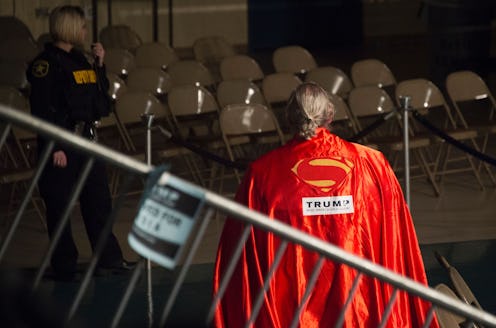News
Superdelegates Have A Strange And Telling History
No other election in recent memory has seen quite this much stir over "superdelegates", the Democratic party's unpledged delegates who vote independently at the Democratic National Convention. As the question of who this year's superdelegates will vote for at the DNC looms heavily over the minds of political spectators and pundits alike, another question follows in its wake: why do we even have superdelegates in the first place?
The history of these wild card delegates isn't nearly as sordid as some Bernie Sander supporters would have you believe, but it is admittedly based on Democratic party officials' desire to control the nomination process at the DNC. They were first created in 1982 by former North Carolina Governor Jim Hunt in what is now known as "The Hunt Commission", a commission whose sole purpose was to figure out how to avoid embarrassing defeats like those of George McGovern by Richard Nixon in 1972 and Jimmy Carter to Ronald Reagan in 1980. Their goal was to win elections again, and to nominate candidates that Democratic party officials felt best represented the "mainstream" of the party. Electing nominees through primaries and caucuses alone was not getting the job done, so the superdelegate was introduced. Despite their wishes, their first test of the superdelegate experiment with presidential hopeful Walter Mondale in 1984 failed miserably.
There are a number of arguments as to why the Democratic party currently employs superdelegates in their nomination process. At its face, the advent of the superdelegate was created to ensure candidates represent the will of the party and to prevent the nomination of scandalous candidates like Mondale's opponent Gary Hart, who was found cheating on his wife at the height of his popularity and campaign for the Democratic nomination.
More cynical critics have gone so far as to argue superdelegates exist to stop candidates like Sanders and help seemingly less-popular but more Democratic-establishment oriented candidates like Hillary Clinton secure a Democratic nomination. Others defend the system by saying that superdelegates have served their purpose in the past (although they didn't catch Bill Clinton) and are an important tool to guard against voter fraud in states like Georgia and Michigan that have open or semi-open primaries where non-Democrats can vote for the candidate of their choosing, therefore not truly representing the will of registered Democrats.
In one critical way, Sanders is right: the superdelegate clause of the DNC nomination process is intended to represent the will of former and current party insiders. Sanders has not been a Democrat for very long, and is by no means a party insider, especially compared to Clinton's long tenure among the Democratic elite. If they are against him (as it seems they are), it's due to the fact that he seems to have invaded their territory and stolen the spotlight from the woman who they've been trying to elect for at least 8 years. It's a hard pill to swallow, but superdelegates were created to protect their own, and Sanders is not one of them.
